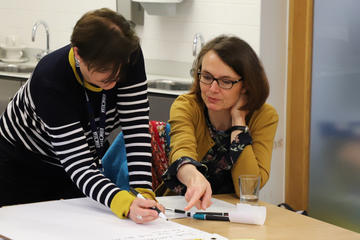Supporting Leadership
The TORCH Heritage Partnerships Team is pleased to feature this blog post by Vanessa Moore, formerly National Trust Partnership Support Officer, about the findings of the Supporting Leadership project.
It is no secret that the cultural and heritage sectors are filled with talented and dedicated individuals. Organisations depend upon their unwavering commitment and without it, would not survive. There has been great progress over recent years in recognising the contributions of particular groups, front of house and volunteers for example, but there has been one staff group that has remained very much behind the scenes – the administrative staff working tirelessly to support senior management.
“We can be invisible and only thought of when things go wrong.” Support staff
The Supporting Leadership Report, published in June 2020, has sought to change this and to reveal and recognise the importance of this staff group. The report presents the findings of the Supporting Leadership project, a research and knowledge exchange project that has used a nationwide digital consultation to investigate these roles: what they do, how they do it, and why it matters.
These may seem like simple questions but they are surprisingly tricky to answer. The value of support roles is difficult to quantify – unlike other roles, support staff rarely have their own specific outputs and deliverables, instead they have an enabling function in relation to outputs or deliverables that belong to others or more broadly to organisations as a whole. Through the consultation, however, and a detailed analysis of the reflections that were shared, it has been possible to get a tangible sense of the intangible benefits that are connected to these roles. The report sets out nine distinct types of value: time, action, organisation, foresight, memory, consistency, mediation, honesty, and insight. Support staff are relied upon by their colleagues to know what to do and to get it done, they offer stability and consistency in changeable workplaces, and their reach extends across and beyond their organisations as they manage relationships with staff and stakeholders.
“I’m able to speak to and work with anyone and everyone to get things done.” Support staff
Crucially, support staff free up leaders to lead, preserving and protecting their time and taking care of the small details so that they can focus on the bigger picture.
“My failure to pay close enough attention to health and safety, and to budgets, due to being spread too thin due to administrative tasks could have severe consequences for the organisation, reputationally and legally.” Leader
This work is not easy. Participants in the consultation noted the challenges they faced managing ever expanding remits and ever increasing workloads. Contrary to possible perceptions surrounding the scope of these roles, the majority (69%) of the support staff surveyed reported that they were an assistant to more than one individual – reflecting the constant pressure to do more, for more people, with the same amount of resource – and there was also great complexity seen in the extent of their remits, with 25 different job titles and 44 distinct work areas identified.
More importantly, both leaders and support staff identified an issue with perceptions – they felt that support roles were not well understood and not well respected.
“I think the role isn’t well understood, it can be abused and used as a dogsbody role.” Leader
“I think people have the tendency to think that it is the type of role that anyone could do....It has always irked me somewhat when I’ve heard people say that they “can always be a PA” without really knowing the levels of judgement, tact, communication skills, organisational ability and so on that are needed.“ Support staff
This lack of respect can create practical barriers to the fulfilment of the role, as support staff are misused or struggle to work with colleagues who see their needs and requests as low priority, but it also has a significant impact on staff at a personal level. Most of the support staff surveyed reported some level of discontentment and many were thinking about leaving their current positions: 36% were either actively looking for new opportunities or intended to start looking within a year, 33% saw themselves looking within 1-3 years, and only 31% saw themselves in the same role in 3 years time. Whilst it is important for organisations to be dynamic and open to bringing in new ideas and approaches, high levels of turnover create instability and risk the loss of valuable professional expertise.

Support staff from Oxford University’s Gardens, Libraries and Museums taking part in a focus group as part of the Supporting Leadership project. © University of Oxford Gardens, Libraries and Museums
In heritage specifically, the intentions of support staff were aligned with the results of the consultation overall with only 33% of participants reporting that they could see themselves in the same role in 3 years time. There was a remarkable amount of common ground seen across the experiences of all of the support staff who participated, however, the heritage and libraries and archives categories scored slightly lower than other organisation types in relation to the opportunity that support staff had to shape and define processes, and the heritage category scored highest in relation to the need for support staff to cover other staffing gaps. Heritage organisations can often be financially vulnerable and these results may reflect mounting pressure on resources, showing that staff are being forced to operate in a fire-fighting capacity rather than being able to focus on moving their institutions forward.
The Supporting Leadership Report identifies many opportunities to change the experience of support roles to ensure that staff are able to thrive and to commit to and perform at their best for their organisations. It sets out six key recommendations around the themes of definition, information, awareness, empowerment, mutual benefit, and room for growth, and provides practical advice through a series of four tools focusing on role descriptions, working environments, recruitment processes, and development pathways.
More than ever, as the cultural and heritage sectors embark on a period of great change, responding to the disruption of the global pandemic and seizing and building on the momentum created by the Black Lives Matter movement, institutions will need to be able to retain and draw upon skilled members of staff if they are to successfully tackle the big issues that must be addressed.
Support staff should not be forgotten in this endeavour.
The project findings and detailed recommendations and resources can be viewed in the Supporting Leadership Report which is available to download here.
The Supporting Leadership project has been carried out by Vanessa Moore and Emma Thomas. It has been funded by the University of Oxford’s Knowledge Exchange Seed Fund.
The digital consultation received over 120 contributions from individuals in more than 60 different institutions. The intention for the consultation was to reach out as broadly as possible to explore both the cultural and heritage sectors, and the project team are grateful for the support of both the Gardens, Libraries and Museums division and the Humanities division, and specifically the Heritage Partnerships Team and The Oxford Research Centre in the Humanities (TORCH), for their assistance connecting with such a diverse range of relevant institutions.

The Tower of the Winds of the old Radcliffe Observatory building in Oxford features two statues by John Bacon, representing Atlas and Hercules supporting the globe. The frieze below consists of eight relief images of Greek mythological wind gods. © Oxford University Images / Whitaker Studio


